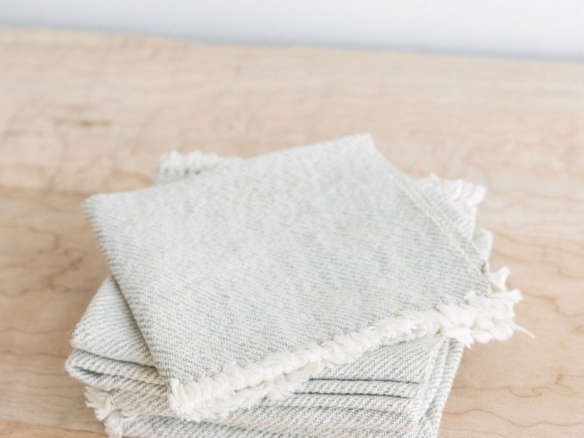When it comes to kitchen essentials, the humble tea towel is often overlooked, yet it plays a pivotal role in our daily culinary activities. Among the myriad of options, linen tea towels stand out as a superior choice for several compelling reasons.
Why Linen Tea Towels?
Firstly, linen, derived from the flax plant, quietly boasts remarkable durability. Flax is a flowering plant with many diverse uses and has been around for thousands of years. The seeds have been used for food, food supplements, and oil, while the fibres of this ancient plant have been used to make cloth, rope, and paper.
The fibre is well-known for its strength, ensuring that your tea towels will withstand the test of time, even with frequent usage and washes. Unlike other materials, linen gets softer with each wash, enhancing the usability and comfort of these tea towels without sacrificing their durability.
And linen’s absorbency is unmatched, too. It can absorb up to 20% of its weight in moisture before feeling damp, making linen tea towels exceptionally efficient for drying dishes and hands or even for handling hot cookware due to their quick-drying nature.
The hypoallergenic and antibacterial properties of linen add to its appeal, especially in a kitchen environment. These characteristics make for a healthier and more hygienic space, which is crucial in any home.
Finally, the eco-friendly aspect of linen can’t be overstated. It’s a renewable resource, with the cultivation of flax having minimal impact on the environment. This makes linen tea towels not just a practical choice for your kitchen but also a responsible one.
Linen tea towels are durable, functional, and eco-friendly, making them an unparalleled choice in kitchen textiles.
Linen vs. Cotton: Which One is Better?
When it comes to choosing between tea towels, each has its merits, but what is the difference between cotton and linen tea towels?
The main characteristics that savvy homemakers are typically looking for in tea towels are absorbency, durability, lint production, eco-friendliness, and texture.
Let’s compare these two textiles.
- Absorbency:
- Linen: Highly absorbent, linen quickly wicks away moisture, making it ideal for drying dishes efficiently.
- Cotton: Cotton is also absorbent but retains moisture longer, leading to a damp feel and mildew with extended use.
- Durability:
- Linen: Exceptionally strong and durable, linen tea towels withstand frequent use and washing, often lasting longer.
- Cotton: While reasonably durable, cotton can wear out faster than linen, especially with heavy use.
- Lint Production:
- Linen: Naturally lint-free, linen leaves no residue or fluff behind when you’re drying glassware or polishing silverware.
- Cotton: Initially softer, cotton can leave lint on dishes, which can be a drawback for those seeking a spotless finish.
- Texture:
- Linen: Linen starts off crisp but becomes softer and more pliable with each wash, maintaining a slightly textured feel.
- Cotton: Known for its initial softness, cotton has a smoother texture from the start but may become rougher over time.
- Eco-Friendliness:
- Linen: Made of flax, linen requires less water and pesticides to produce. It’s a more resilient crop, making it easier to grow in more areas.
- Cotton: Cotton requires more water and pesticides to produce.
Each of these characteristics contributes to the overall functionality and appeal of the tea towels. Breaking down the question of what is the difference between linen and cotton tea towels can help you choose the best option for your specific needs and preferences.
How To Wash Linen Tea Towels
Linen tea towels are easy to care for, but it’s important to know how to wash them to prevent damage and discoloration.
They should be machine-washed in warm water with a mild detergent, avoiding bleach.
Handwashing with mild detergent is also an option for delicate linen tea towels. Stains should be treated promptly, using gentle methods like dish soap or a mixture of hydrogen peroxide and water for tougher stains.
Air drying is ideal for linen tea towels. Lay them flat or hang them to dry. If you use a dryer, choose the lowest heat setting and remove the towels while they’re still slightly damp to avoid over-drying.
Don’t Be Afraid of the Wrinkles!
At Cedar Mountain Studios, we aren’t afraid of any wrinkles in our linen. In fact, we embrace them.
Wrinkles are an inherent characteristic of linen tea towels and are often embraced as part of its natural charm. The tendency of linen to wrinkle isn’t just a byproduct of its use but a reflection of its authenticity. Many linen enthusiasts appreciate this aspect, seeing it as adding an aesthetic and rustic touch to the fabric.
For a more formal, smoother look, linen can be easily ironed. This allows linen tea cloths to cater to both casual and formal decor, making them a great choice for diverse styles and preferences.
An Enduring Linen Elegance
Linen tea towels are more than just kitchen accessories —they’re a blend of tradition, functionality, and style. Their durability, absorbency, and elegance make them a wise investment for any home.
Recognizing the differences between linen and cotton tea towels ensures you make an informed purchasing decision based on your needs, and understanding how to wash linen tea towels will prolong the lifespan of these practical but elegant accessories.

